Here we will post our analysis of the answers to the questions. We will work in pairs or small groups, and analyse/comment one question each. Here is the data to be commented:
data_QOL_AT_REU_2021-01-04.xlsx
1. Analysis by Cohême, Tu Anh, Bastien and Thomas:
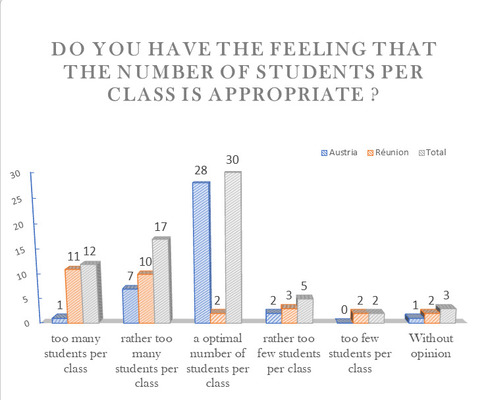
This histogram shows if the students of Reunion island and Austria are satisfied by the number of students per class. We can see here that 66 people out of 69 answered the question. We didn’t mind if the students were male or female in our results thought.
It can be read on this diagram that Students from Reunion island globally think that there is way too much students per class while Austrian students are mostly satisfied of the number of students per class.
We expected theses results because in reunion island we are averagely 30-35 students per class and due to various factors (like high temperatures, number of teachers in the high school, number of students in the high school, …) the climate can be unbearable without air conditioning system. However, in Austrian classes (we’ve asked to our Austrians correspondent) the classes have 22 students and that’s more appropriated.
Harmfulness of air conditioning systems for the environment.
The massive use of theses can lead to a significant increase in electricity consumption on hot days and by the way an increase of air pollution. And the refrigerant fluid inside the air conditioner is also quite dangerous for climate and can speed up the climate change. So we need to rethink the number of students per class in Reunion island middle and high schools.
2. Pauline and Augustin
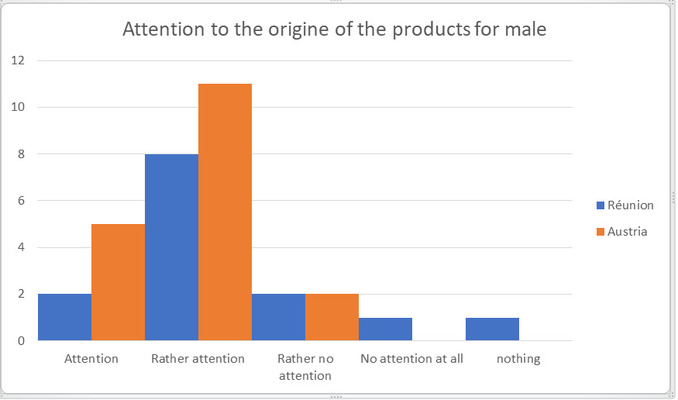
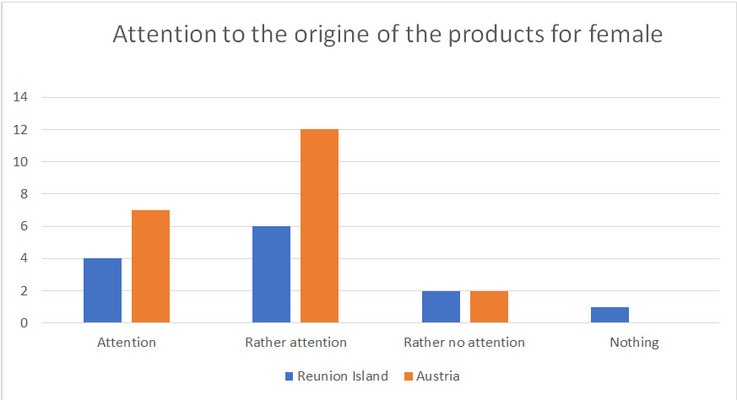
We did a study in this question “Do you pay attention to the origin of the products you buy whether they are local or imported». We made our study according to the gender and the country origin of the people, here are our results:
Austrian men pay about 1.5 times more attention than Reunion men.
Austrian women pay about 2 times more attention than Reunion women.
In conclusion Austria people pay more attention to the origin of the products they buy than Reunion people. There are only Reunion men who said they don’t care attention at all of the origin of the products they buy.
We think this difference is due to the education that they had; the country’s way of thinking is more targeted on ecology. Maybe it’s easier in Austria to find local products whereas in Reunion Island it’s difficult because it’s an island and a lot of products are imported.
3. Hugo F, Hugo O, Lison and Milan
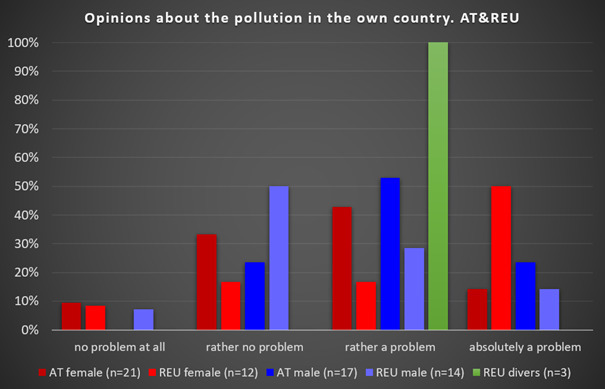
(reusing the Austrian bar graph, thank you!)
A lot of students think pollution is a problem but in Reunion Island, there is a majority of boys who think that there is rather no problem whereas a majority of girls think that it is absolutely a problem. Only a few students in Reunion think that there is not a problem at all. In Austria, boys and girls think that is rather a problem but there is a proportion of female who think that it is rather no problem.
In Reunion Island girl students care a lot more about pollution than the rest and in Austria, both genders care about pollution.
In conclusion, we can see that the Austrians are more interested in the issue of pollution than Reunionese, perhaps because climate change is more important for them than for Reunion Island, or perhaps they talk about it more at school. One thing is for sure, we all agree that pollution is a problem.
4. Mathys, Arya, Tom F, Eliott:
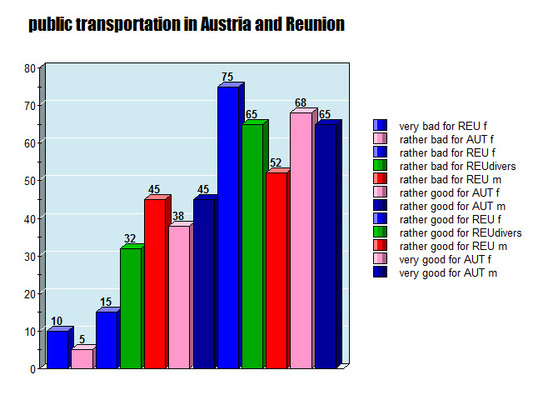
This diagram shows the quality of transport in Austria and Reunion. We can observe in both countries that transport is rather good. It is also known that many Austrians find the public transport very good. Moreover we know that almost no one finds public transport very bad. We can also see that most of the girl of the Reunion find all the transport rather good. But aproximatively 50% of the boys in the Reunion island find the transport rather bad, it’s a lot. We can see that the Austrians like their transport more than the Reunionese, perhaps because it is more advanced than that of the Reunionese, for example : the metro.
5. Raména and Mélinka:
Previously, we did a survey about quality of life in Austria and Reunion Island. We did a graph with the responses to question 6 which is: Do you have ecological fittings in
your house to regulate or reduce your energy consumption? (like solar panels).
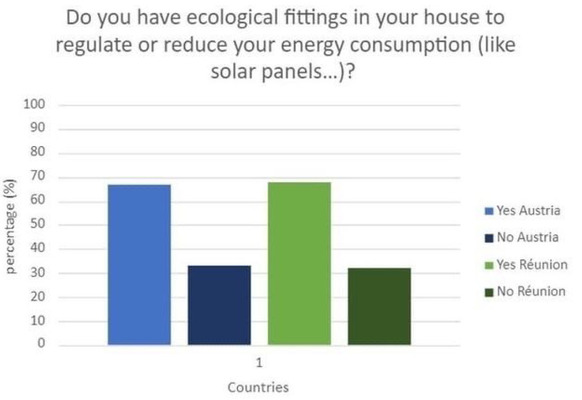
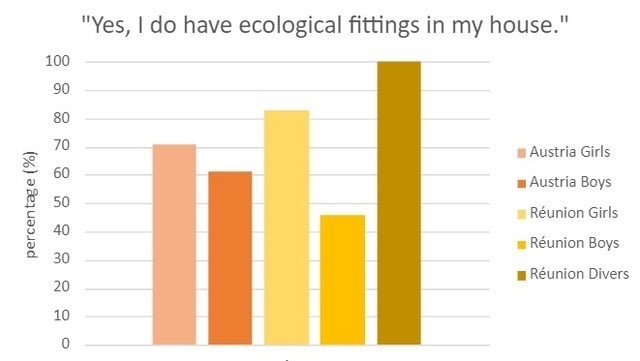
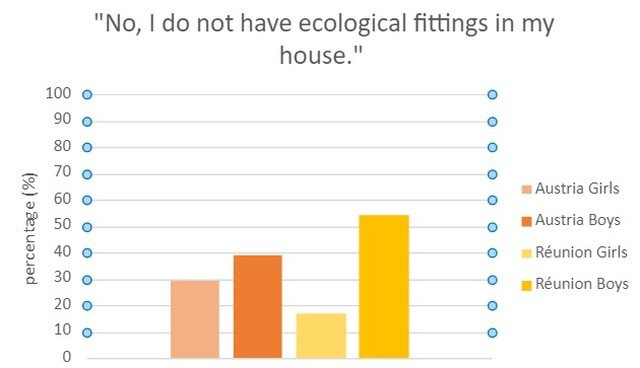
We can see that the majority of students of both countries have ecological fittings in their house. In Austria and La Reunion a large proportion of girls have ecological fittings whereas boys don’t. Maybe boys tend to not notice eco-friendly installations in their home, while girls are more invested in ecology. According to the survey, 54 percent of boys in reunion island don’t have energy-saving devices, which is surprising because we thought Reunion island is eco-friendly.
There are still a lot of people who don’t have ecological fittings in their home. We hope that soon, more people will have eco-friendly installations to reduce their energy consumption to help saving the planet.
7. Youna, Maëllis and Lina:
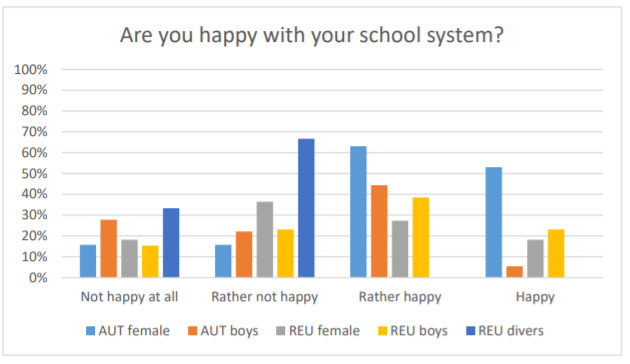
Austrian are happy with their school system while among the majority of reunionese is between rather happy and rather unhappy. We also can see that Austrian girl really appreciate their school system compared to Austrian boys(We did not find any information about that).
If Austrian students are happier with their school system than students from La Réunion. It could be because Austrian start school 8 a.m and finish at 2 p.m. While we start at 7:30 a.m and finish at 5 p.m. They have more time than us to devote to their extracurricular activities. They can therefore become more autonomous.
The average number of pupils per class is also much lower in Austria, 20 to 25 pupils/class in Austria (based on their analysis) versus around 30 pupils/class in La Réunion. Overburdened class are suffocating and not conducive to a proper working environment.
The classroom environment is much better and less overwhelming in Austria and that's why they enjoy their school system.
8. Eloïse, Elisabeth, Juliette R:
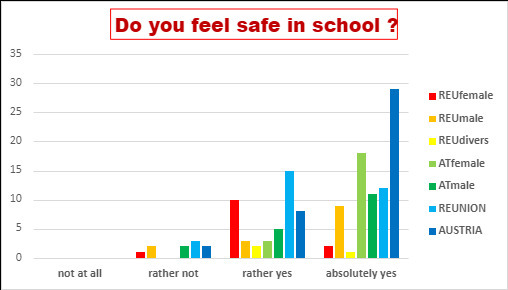
So, it’s a graph that represents students from Austria and reunion island which tell us if they feel safe or not in their school. According to the results, we can see that everyone feels more or less safe in school. Nevertheless, there’s still a minority of students who answered that they didn’t really feel safe. We will analyze these results closely. First, we will make the difference between the results of the students in Austria and in reunion island and right after between boys and girls.
Globally Austria students feel a lot safer than reunion students which is a bit surprising for us.
On the one hand, we are really surprised by the results of the Reunionese students. Because according to us, our school is really well secured, we have several actions which are set up to take care of the good and the safety of the students. For example, we have training of fire alarm, alarm attack... Moreover, every morning we have to show our logbook to be able to enter to avoid any dangerous intrusion.
On the other hand, we see that the Austrians feel safe unlike us, but we didn't expect these results because a short time ago they suffered an attack.
Now between boys and girls we can see that in Austria, girls feel totally safer than boys whereas in reunion the boys feel safer than girls. In general Girls feel absolutely safe in Austria while in reunion they feel rather safe.
9. Sindhu, Clémence, Sarah
Are there any projects in place for ecology in your school?
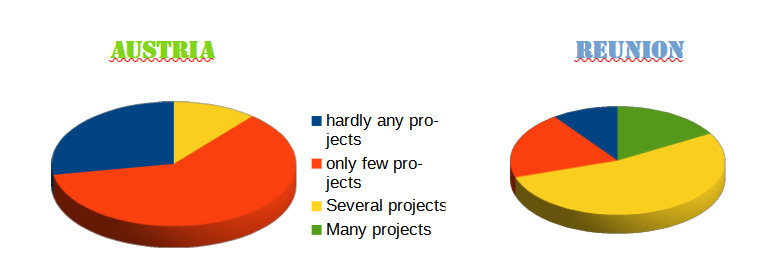
According to our results, we notice that in Austria there is less projects for ecology in their high school than in Reunion school :
Indeed in Austria there is 27,7% of hardly any projects, 61,1% of only few projects, 11,1% of several projects and 0% of many projects.
Whereas in Reunion there is 10% of hardly any projects, 20% of only few projects, 53,3% of several projects and 16,6%of many projects.
On one hand, we suppose that Austrian have already done a lot of projects for a long time ago, so now they are used to it. For them ecology is a daily fight! Maybe these actions aren’t considerate like projects, unlike in Reunion island, where the ecologics projects are new because we just recently understood that this is a priority and a very big problem, thanks to that we will do a lot of little actions which will make big changements!(The Austrian seems to have understood that before us!)
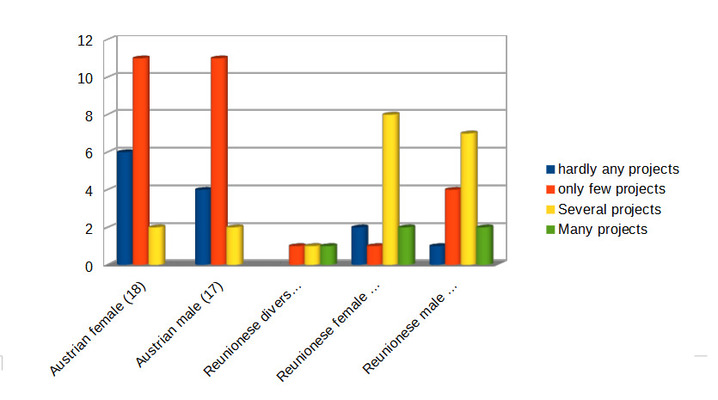
It seems to have almost no differences between Austrian male and female: The most of them answered that there are only few projects,
And it’s the same between Reunionese male and female, there is almost no differences : The most of them answered that there are several projects.
The only differences are:
Austrian girls think that there are less projects in place for the environnement than the boys.
However, Reunionese girls think that there is more ecological projects
than the boys
But we can see that there are as many only few projects as there are several projects and many projects for Reunionese divers. But there aren’t hardly and projects. It’s a little bit strange because it’s not precise! Maybe they have just a different vision of the number of projects in their high school.
According to us the differences between genders of the same country(except for the divers) is useless. And the most important thing to notice is the variations in the number of projects in this two countries.
10. Anouk, Violette, Juliette P, Alicia:
Analysis of our answers to the question:
What are you proud of in your countries ?
First of all we have a lot in common. The pupils in Austria like nature and mountains. In Reunion too, we are really proud of our biodiversity. Our landscape is important for both. In Reunion Island, a little part of us like our landscapes for our beaches and a part of Austrian’ pupils are proud of her freshwater. The two countries are proud that we search solutions to save our environment. Secondly, they are proud of the safety of their country. There is no war in Austria. A little part of us are proud of the great skiing athletes. Finally, in Austria they are proud of the good health system, social system and the education system, they are proud of the high living standard.
In Reunion Island, almost all of the answers are about the diversity of cultures, origins and religions. We are proud of the fraternity. At last, a large part of both like her Gastronomy’s countries. As a conclusion, we have a lot in common: we are all proud of our countries and their values.
11. Nuria, Gabriel, Tom C
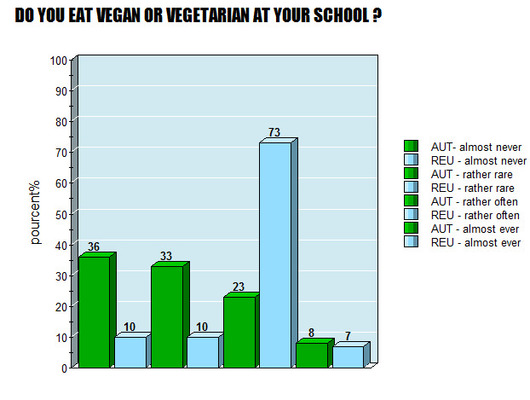
There is apparently a big difference between the austrians' meals and the reunion's meals at school. Indeed, more than half of the reunion's students (73%) consider that they eat rather often vegetarian meals when the third of the Austrians think that they almost never eat those, and only 8% of them esteem that they almost ever have vegetarian meals.